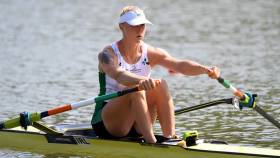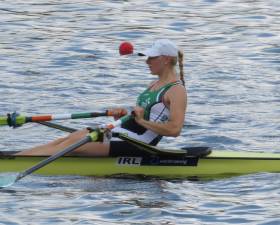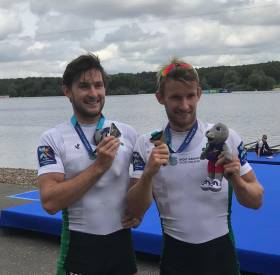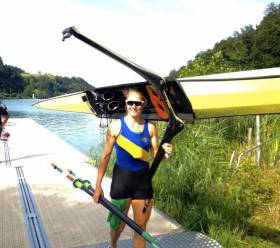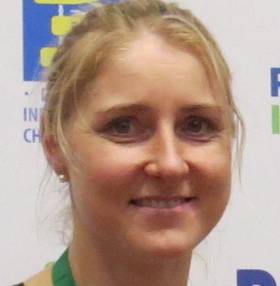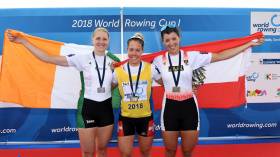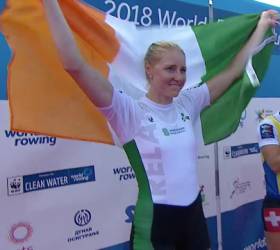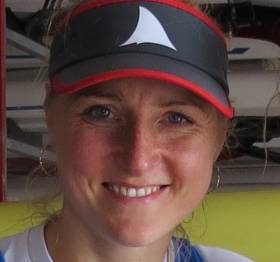Displaying items by tag: Sanita Puspure
Puspure Wins Semi-Final to Take A Final Place at World Rowing Championships
#Rowing: Sanita Puspure won her semi-final and progressed confidently to the A Final of the single sculls at the World Rowing Championships in Plovdiv, Bulgaria. While Fie-Udby Erichsen of Denmark staged an early challenge and led, Puspure swept through her as they approached the 1,000 metres. She then powered away and won with two lengths of clear water to spare.
Carling Zeeman was a good tip to join the two in the A Final, but caught a crab which momentarily stopped her boat. Annekatrin Thiele took the third and final qualifying spot.
Jeannine Gmelin of Switzerland won the second semi-final from Kara Kohler of the United States, with Magdalena Lobnig of Austria just squeezing out Madeleine Edmunds of Australia for the third A Final spot. Gmelin’s time was just .92 of a second off Pupure’s.
World Rowing Championships, Plovdiv, Bulgaria, Day Six (Irish interest)
Men
Double – Semi-Final One (First Three to A Final; rest to B Final): Britain 6:06.59, 2 New Zealand 6:08.00, 3 Romania 6:08.17; 5 Ireland (P Doyle, R Byrne) 6:10.95.
Women
Eight – Repechage (First Four to A Final): 4 Britain (8 R Shorten) 6:04.63.
Single Sculls – A/B Semi-Final (First Three to A Final; rest to B Final): 1 Ireland (S Puspure) 7:23.01, 2 Denmark (F-U Erichsen) 7:30.73, 3 Germany (A Thiele) 7:32.74.
Puspure Dominates Heat at World Rowing Championships
#Rowing: Sanita Puspure punched in an outstanding performance as she won her heat of the single sculls at the World Rowing Championships in Plovdiv in Bulgaria. The Ireland sculler led off the start and gave her opponents no chance to challenge her for the one semi-final qualfication place on offer. She had a clearwater lead by 500 metres and eventually won by over 14 seconds from Fie-Udby Erichsen of Denmark.
Monika Dukarska and Aileen Crowley looked good in the early stages of their heat of the women’s double sculls, but the race got away from them in the second 1,000 metres and they finished sixth. Canada and Germany were clear leaders through the middle of the race and looked set to take the two qualification spots for the semi-finals. The Netherlands pushed up in the final third of the race and took out Germany, who dropped back to fourth.
World Rowing Championships, Plovdiv, Bulgaria, Day Two (Irish interest)
Men
Lightweight Quadruple Sculls – Heat Two (First to A Final; rest to Repechage): 1 Italy 5:48.03; 3 Ireland (F McCarthy, R Ballantine, J McCarthy, A Goff) 5:53.43.
Women
Double Sculls – Heat One (First Two to A/B Semi-Final; rest to Repechage): 1 Canada 6:54.02, 2 Netherlands 6:55.57; 6 Ireland (M Dukarska, A Crowley) 7:08.79.
Single Sculls – Heat One (Winner to A/B Semi-Finals; rest to Repechage): 1 Ireland (S Puspure) 7:25.78; 2 Denmark 7:39.93.
Ireland Name Big Team for World Rowing Championships
#Rowing: Seven Ireland crews have been chosen for the World Rowing Championships in Plovdiv, Bulgaria, from September 9th to 16th. There are four women’s crews, headed by Sanita Puspure in a single scull. Aifric Keogh and Emily Hegarty will compete in a pair and Monika Dukarska and Aileen Crowley in a double. The lightweight double of Aoife Casey and Denise Walsh, which competed at the European Championships, go forward.
European silver medallists Paul and Gary O’Donovan will compete in Bulgaria, while there is a heavyweight double of Ronan Byrne and Philip Doyle, which will be competing together at this level for the first time. The heavyweight pair of Mark O’Donovan and Shane O’Driscoll which finished 11th at the European Championships will compete in Plovdiv.
Another crew may be added to the team this week.
Ireland Team for World Rowing Championships, Plovdiv, Bulgaria, September 9th to 16th:
Men
Pair: M O’Donovan, S O’Driscoll
Double Sculls: Ronan Byrne, Philip Doyle
Lightweight Double Sculls: Gary O’Donovan, Paul O’Donovan
Women
Pair: Aifric Keogh, Emily Hegarty
Double Sculls: Monika Dukarska, Aileen Crowley
Lightweight Double Sculls: Aoife Casey, Denise Walsh
Single Sculls: Sanita Puspure
Other crews may be added
Puspure Takes Silver Medal at World Cup Rowing In Lucerne
#Rowing: Sanita Puspure took a silver medal for Ireland at the World Cup Regatta in Lucerne. The world champion, Jeannine Gmelin of Switzerland took gold, but only just, in a thrilling finish. Puspure was under pressure for second from Carling Zeeman of Canada, but the Ireland sculler has a great finish and pushed right up on Gmelin, finishing just .23 of a second behind her.
World Cup Regatta, Lucerne, Day Three (Selected Results; Irish interest)
Men
Pair – B Final (Places 7 to 12): 1 Spain Two 6:40.42; 3 Ireland (M O’Donovan, S O’Driscoll) 6:43.27.
Lightweight Double Sculls – A Final: 1 Ireland (G O’Donovan, P O’Donovan) 6:28.50, 2 Belgium 6:29.30, 3 Denmark 6:32.39.
Women
Pair – B Final: 1 Spain 7:25.23; 4 Ireland (A Keogh, T Hanlon) 7:32.46.
Double – B Final: 1 Czech Republic 7:05.30; 3 Ireland (M Dukarska, A Crowley) 7:06.92.
Single – A Final: 1 Switzerland (J Gmelin) 7:35.94, Ireland (S Puspure) 7:36.17, 3 Canada (C Zeeman) 7:37.03
Puspure Wins Semi-Final at World Cup Regatta in Lucerne
#Rowing: Sanita Puspure won her semi-final of the single sculls at the World Cup Regatta in Lucerne with a dominant performance. Annekatrin Thiele of Germany disputed the lead in the first quarter, but Puspure led by the 1,000 metre mark and was clear by over four seconds at the finish. Austria’s Magdalena Lobnig pushed past Thiele to take second.
World Cup Regatta, Lucerne, Day Two (Irish interest; selected results)
Men
Pair – A/B Semi-Final One (First Three to A Final; rest to B Final): 1 Serbia 6:33.87, 2 Spain 6:36.65, 3 Britain One 6:38.90; 4 Ireland (M O’Donovan, S O’Driscoll) 6:42.02.
D Final (Places 19 to 24): 1 Poland 6:40.95; 5 Ireland (P Boomer, A Harrington) 6:53.83.
Single Sculls – C Final (Places 13 to 18): 1 Australia 6:58.52, 2 Argentina 6:59.65, 3 Ireland (P Doyle) 7:00.39.
Women
Pair - Repechage (First Two to A Final; rest to B Final): 1 Australia 7:18.62, 2 China One 7:19.86; 4 Ireland (A Keogh, T Hanlon) 7:29.63.
Double – Semi-Final (First Three to A Final; rest to B Final): 1 New Zealand 6:53.91, 2 Canada 6:57.71, 3 Netherlands 6:58.57; 4 Ireland (A Crowley, M Dukarska) 7:06.42.
Single Sculls – Semi-Final (First Three to A Final; rest to B Final): 1 Ireland (S Puspure) 7:39.59, 2 Austria (M Lobnig) 7:43.68, 3 Germany (A Thiele) 7:45.59.
#Rowing: Sanita Puspure won her heat of the single sculls impressively to qualify directly for the semi-final of the World Cup Regatta in Lucerne. Puspure was tested somewhat to 1500 metres by Kara Kohler of the United States, but only the winner would avoid the repechage, and the Ireland sculler built her lead. Kohler slipped back and settled for second. Three other Ireland crews had already hit the mark in their heats.
World Cup Regatta, Lucerne, Day One (Irish interest; selected results)
Men
Pair – Heat Two (First Four to Quarter-Final; rest to Quarter-Final or E Final): 1 Spain 6:40.29; 3 Ireland Two (P Boomer, P Harrington) 6:45.74
Heat Six (First Three to Quarter-Final; rest to Quarter-Final or E Final): 1 Croatia 6:37.66, 2 Ireland One (M O’Donovan, S O’Driscoll) 6:40.95.
Women
Pair – Heat Two (First to A Final; rest to Repechage): 1 Canada 7:13.98; 6 Ireland (A Keogh, T Hanlon) 7:32.49.
Double Sculls – Heat Two (First Three to A/B Semi-Finals; rest to Repechages): 1 United States 6:58.58, 2 Ireland (A Crowley, M Dukarska) 7:03.05.
Single Sculls – Heat One (First to A/B Semi-Final; rest to Repechages): 1 Ireland (S Puspure) 7:26.51; 2 United States 7:40.98.
Puspure's Trial Form Set Stage for Silver Achievement
#Rower of the Month: Sanita Puspure is the Afloat Rower of the Month for May. The Old Collegians sculler had struggled with injury early in the year, but come the Ireland trial at the National Rowing Centre, she was one of the top performers. She would carry that form into the first World Cup Regatta in Belgrade, where she took silver behind world champion Jeannine Gmelin of Switzerland and ahead of world bronze medallist Magdalena Lobnig of Austria and Britain’s Victoria Thornley, the silver medallist at last year’s World Championships.
May was also an excellent month for Irish juniors. Castleconnell were honoured as the best junior club at the Ghent International Regatta. Enniskillen, Workmen’s, Bann and Fermoy also shone at the British National Schools Regatta on Dorney Lake. Fermoy’s Gill McGirr and Eliza O’Reilly won gold in the Championship Pair.
Rower of the Month awards: The judging panel is made up of Liam Gorman, rowing correspondent of The Irish Times and David O'Brien, Editor of Afloat magazine. Monthly awards for achievements during the year will appear on afloat.ie. Keep a monthly eye on progress and watch our 2018 champions list grow.
#Rowing: Sanita Puspure took an excellent silver medal at the World Cup Regatta in Belgrade this morning. Jeanine Gmelin of Switzerland took the gold with a commanding performance, overtaking early leader Magdalena Lobnig of Austria by halfway.
Puspure raced well, taking a clear third place by the closing stages and then beating Lobnig in a battle for the silver.
World Cup Regatta, Belgrade, Day Three (Irish interest)
Men
Lightweight Double Sculls – A Final: 1 Poland 6:13.04, 2 Belgium 6:14.09, 3 (G O’Donovan, P O’Donovan) 6:14.10; 4 Canada Two 6:17.27, 5 Austria 6:17.32, 6 Switzerland Two 6:23.87.
Women
Single Sculls – A Final: 1 Switzerland (J Gmelin) 7:22.78,
2 Ireland (S Puspure) 7:25.30
3 Austria (M Lobnig) 7:25.51; 4 Germany 7:27.84, 5 Britain 7:27.93, 6 Denmark 7:31.96.
Puspure Opens With Commanding Win at World Cup Rowing
#Rowing: Sanita Puspure booked her places in the semi-finals of the World Cup in Belgrade with a commanding win in her heat. The Ireland single sculler had a slight lead by the 500 metre mark over Diana Dymchenko of the Ukraine. Puspure extended her advantage by halfway and then moved clear in the second 1,000 metres. Carling Zeeman of Canada tried to push into the second – and final – qualifying spot but could not get past Dymchenko, who finished almost nine seconds behind Puspure.
World Cup Regatta, Belgrade (Irish interest)
Men
Pair – Heat Four (Winner to A/B Semi-Finals; rest to repechage): 1 Czech Republic 6:41.22; 2 Spain 6:48.03, 3 China One 6:51.79, 4 Ireland (M O’Donovan, S O’Driscoll) 6:51.91.
Women
Pair – Heat One (First Three to A/B Semi-Finals; rest to repechage): 1 Britain One 7:19.05, 2 Britain Two 7:22.92, 3 Ireland (A Keogh, E Hegarty) 7:23.77.
Double Sculls – Heat Three (First Three to A/B Semi-Finals; rest to repechage): 1 Netherlands 7:10.90, 2 China One 7:16.89, 3 Ireland (A Crowley, M Dukarska) 7:20.40.
Single Sculls – Heat One (First Two to A/B Semi-Finals; rest to repechage): 1 Ireland (S Puspure) 7:50.48, 2 Ukraine (D Dymchenko) 7:59.30.
O'Donovan and O'Driscoll Given Big Test
#Rowing: Sanita Puspure and Paul O’Donovan were impressive winners of the single sculls tests at the Ireland trial at the National Rowing Centre today. Shane O’Driscoll and Mark O’Donovan won their pairs race, but only by 2.8 seconds from the very tall crew of Andy Harrington and Patrick Boomer.
Denise Walsh won the lightweight single sculls from Margaret Cremen. Aoife Casey was absent because of exams. The top women’s pair were Aifric Keogh and Emily Hegarty, while Aaron Keogh of Three Castles beat Rory O’Neill of Castleconnell in the junior single sculls.


























